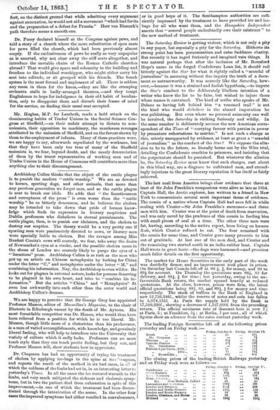The Saturday Review is getting violent, which is not only
a pity in any paper, but especially a pity for the Saturday. Hitherto its strong point has been pococumntism and calm Sadducee charity. But recently it has raged furiously and imagined vain things. It was natural perhaps that after the inclusion of Mr. Beresforcl Hope's name in the forged Confederate Loan list, it should rail bitterly against the Star for what it rightly called a "scandal of journalism" in assuming without due inquiry the truth of a docu- ment so untrustworthy. It was scarcely like the Saturday, how- ever,—because it was a strained and foolish hypothesis,—to impute the Star's conduct to the deliberately libellous intention of a writer who knew the list to be false, but wished to injure those whose names it contained. The kind of scribe who speaks of Mr. Delano as having left behind him "a venomed trail" is not the kind who would disbelieve in the absurd imputation he was publishing. But even where no personal animosity can well be involved, the Saturday is striking furiously and wildly. In the same number it deliberately accuses the new American corre- spondent of the Times of "currying favour with parties in power by premature exhortations to murder." Is not such a charge as this, utterly unsupported by evidence, at least as great a "scandal of journalism" as the conduct of the Star? We suppose the allu- sion to be to the letters, so literally borne out by the Wirz trial, detailing the Confederate cruelties to prisoners, and insisting that the perpetrators should be punished. But whatever the allusion be, the Saturday Review must know that such charges, cast about in this blind way, are a disgrace to cultivated men, and exceed- ingly injurious to the great literary reputation it has itself so fairly achieved.






























 Previous page
Previous page